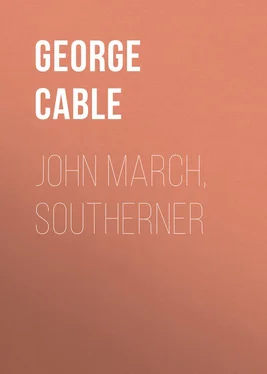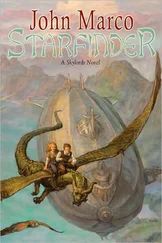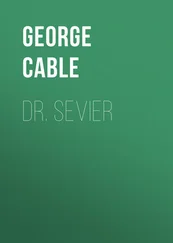George Cable - John March, Southerner
Здесь есть возможность читать онлайн «George Cable - John March, Southerner» — ознакомительный отрывок электронной книги совершенно бесплатно, а после прочтения отрывка купить полную версию. В некоторых случаях можно слушать аудио, скачать через торрент в формате fb2 и присутствует краткое содержание. Жанр: foreign_antique, foreign_prose, на английском языке. Описание произведения, (предисловие) а так же отзывы посетителей доступны на портале библиотеки ЛибКат.
- Название:John March, Southerner
- Автор:
- Жанр:
- Год:неизвестен
- ISBN:нет данных
- Рейтинг книги:3 / 5. Голосов: 1
-
Избранное:Добавить в избранное
- Отзывы:
-
Ваша оценка:
- 60
- 1
- 2
- 3
- 4
- 5
John March, Southerner: краткое содержание, описание и аннотация
Предлагаем к чтению аннотацию, описание, краткое содержание или предисловие (зависит от того, что написал сам автор книги «John March, Southerner»). Если вы не нашли необходимую информацию о книге — напишите в комментариях, мы постараемся отыскать её.
John March, Southerner — читать онлайн ознакомительный отрывок
Ниже представлен текст книги, разбитый по страницам. Система сохранения места последней прочитанной страницы, позволяет с удобством читать онлайн бесплатно книгу «John March, Southerner», без необходимости каждый раз заново искать на чём Вы остановились. Поставьте закладку, и сможете в любой момент перейти на страницу, на которой закончили чтение.
Интервал:
Закладка:
One Sabbath afternoon, after a specially indigestible sermon which Sister Usher said enthusiastically to Major Garnet ought to be followed by a great awakening – as, in fact, it had been – Barbara, slim, straight, and fifteen, softly asked her mother to linger behind the parting congregation for Fannie. As Miss Halliday joined them John, from the other aisle, bowed so pathetically to his Sunday-school teacher that when she turned again to smile on Barbara and her mother she laughed, quite against her will. The mother and daughter remained grave.
"Fannie," said Mrs. Garnet, her hand stealing into the girl's, "I'm troubled about that boy." Barbara walked ahead pretending not to hear, but listening hard.
"Law! Cousin Rose, so'm I! I wish he'd get religion or something. Don't look so at me, Cousin Rose, you make me smile. I'm really trying to help him, but the more I try the worse I fail. If I should meet him on the straight road to ruin I shouldn't know what to say to him; I'm a pagan myself."
XVII.
THE ROSEMONT ATMOSPHERE
About this time Barbara came into new surroundings. She had been wondering for a month what matter of disagreement her father and mother were trying to be very secret about, when one morning at breakfast her father said, while her mother looked out the window:
"Barb, we've decided to send you to Montrose to stay." And while she was still gazing at him speechlessly, a gulping sob came from behind her mother's chair and Johanna ran from the room.
Barbara never forgot that day. Nor did her memory ever lose the picture of her father, as he came alone to see her the next day after her entrance into the academy, standing before the Misses Kinsington – who were as good as they were thin, and as sweet as they were aristocratic – winning their impetuous approval with the confession that the atmosphere of a male college – even though it was Rosemont – was not good for a young girl. While neither of the Misses Kinsington gave a hand to him either for welcome or farewell, when Mademoiselle Eglantine – who taught drawing, history, and French – happened in upon father and daughter a second time, after they had been left to say good-by alone, the hand of Mademoiselle lingered so long in his that Barbara concluded he had forgotten it was there.
"She's quite European in her way, isn't she, Barb?"
The daughter was mute, for she had from time to time noticed several women shake hands with her large-hearted father thus.
Twice a week Barbara spent an afternoon and night at Rosemont. Whether her father really thought its atmosphere desirable for her or not, she desired it, without ceasing and most hungrily. On Sunday nights, when the house had grown still, there would come upon her door the wariest of knocks, and Johanna would enter, choose a humble seat, and stay and stay, to tell every smallest happening of the week.
Not infrequently these recitals contained points in the history of John March.
Rosemont gave one of its unexpected holidays. John March and another senior got horses and galloped joyously away to Pulaski City, where John's companion lived. The seat of government was there. There, too, was the Honorable Mr. Leggett, his party being still uppermost in Blackland. He was still custodian, moreover, of the public school funds for the three counties.
Very late that night, as the two Rosemonters were about to walk past an open oyster saloon hard by the Capitol, John caught his fellow's arm. They stopped in a shadow. Two men coming from an opposite direction went into the place together.
"Who's that white man?" whispered John. The other named a noted lobbyist, and asked,
"Who's the nigger?"
"Cornelius Leggett." John's hand crept, trembling, to his hip pocket.
His companion grasped it. "Pshaw, March, are you crazy?"
"No, are you? I'm not going to shoot; I was only thinking how easy I could do it."
He stepped nearer the entrance. The lone keeper had followed the two men into a curtained stall. His back was just in sight.
"Let's slip in and hear what they say," murmured John, visibly disturbed. But when his companion assented he drew back. His fellow scanned him with a smile of light contempt. There were beads of moisture on his brow. Just then the keeper went briskly toward his kitchen, and the two youths glided into the stall next to the one occupied.
"Yass, seh," Cornelius was tipsily remarking, "the journals o' the day reputes me to have absawb some paucity o' the school funds. Well, supposen I has; I say, jess supposen it, you know. I antagonize you this question: did Napoleon Bonapawt never absawb any paucity o' otheh folks' things? An' yit he was the greates' o' the great. He's my patte'n, seh. He neveh stole jiss to be a-stealin'! An' yit wheneveh he found it assential of his destiny to steal anything, he stole it!
"O' co'se he incurred and contracted enemies; I has mine; it's useless to translate it. My own motheh's husban' – you riccolec' ole Unc' 'Viticus, don't you? – Rev'en' Leviticus Wisdom – on'y niggeh that eveh refused a office!" – he giggled – "Well, he ensued to tu'n me out'n the church. Yass, seh, faw nothin' but fallin' in love with his daughteh – my step-sisteh – sayin' I run her out'n the county!
"But he couldn't p'ocure a sufficient concawdence o' my fellow-citizens; much less o' they wives – naw evm o' mine! No, seh! They brought in they verdic' that jess at this junction it'd be cal'lated to ungendeh strife an' could on'y do hahm." He giggled again.
"My politics save me, seh! They always will. An' they ought to; faw they as pyo as the crystial fountain."
The keeper brought a stew of canned oysters. The lobbyist served it, and Mr. Leggett talked on.
"Thass the diffunce 'twixt me and Gyarnit. That man's afraid o' me – jess as 'fraid as a chicken-hawk is of a gun, seh! – an' which nobody knows why essep' him an' me. But thass jess the diff'ence. Nobody reputes him to steal, an' I don't say he do. I ain't ready to say it yit, you un'stan'; but his politics – his politics, seh; they does the stealin'! An' which it's the low-downdest kind o' stealin', for it's stealin' fum niggers. But thass the diff'ence; niggers steals with they claws, white men with they laws. The claws steals by the pound; the laws steals by the boatload!"
The lobbyist agreed.
"Jess so!" cried Mr. Leggett. "Ef Gyarnit'd vote faw the things o' one common welfare an' gen'l progress an' program, folks – an' niggers too – could affode faw him to vote faw somepm fat oncet in a while an' to evm take sugar on his vote – an' would sen' him to the ligislatur' stid o' me. Thass not sayin' I eveh did aw does take sugar on my vote. Ef I wins a bet oncet in a while on whether a certain bill 'll pass, why, that, along o' my official emoluments an' p'erequisites evince me a sufficient plenty.
"Wife? – Estravagant? – No! – Oh! you thinkin' o' my secon' wife. Yes, seh, she was too all-fired estravagant! I don't disadmire estravagant people. I'm dreadful estravagant myseff. But Sophronia jess tuck the rag off'n the bush faw estravagance. Silk dresses, wine, jewelry – it's true she mos'ly spent her own green-backs, but thass jess it, you see; I jess had to paht with her, seh! You can asphyxiate that yo'seff, seh.
"Now this wife I got now – eh? No, I ain't never ezac'ly hear the news that the other one dead, but I suspicioned her, befo' she lef', o' bein' consumpted, an' – O anyhow she's dead to me, seh! Now, the nex' time I marries – eh? – O yes, but the present Mis' Leggett can't las' much longeh, seh. I mistakened myseff when I aspoused her. I'm a man o' rich an' abundant natu'e an' ought to a-got a spouse consistent with my joys an' destinies. I may have to make a sawt o' Emp'ess Josephine o' her – ef she lives.
Читать дальшеИнтервал:
Закладка:
Похожие книги на «John March, Southerner»
Представляем Вашему вниманию похожие книги на «John March, Southerner» списком для выбора. Мы отобрали схожую по названию и смыслу литературу в надежде предоставить читателям больше вариантов отыскать новые, интересные, ещё непрочитанные произведения.
Обсуждение, отзывы о книге «John March, Southerner» и просто собственные мнения читателей. Оставьте ваши комментарии, напишите, что Вы думаете о произведении, его смысле или главных героях. Укажите что конкретно понравилось, а что нет, и почему Вы так считаете.











